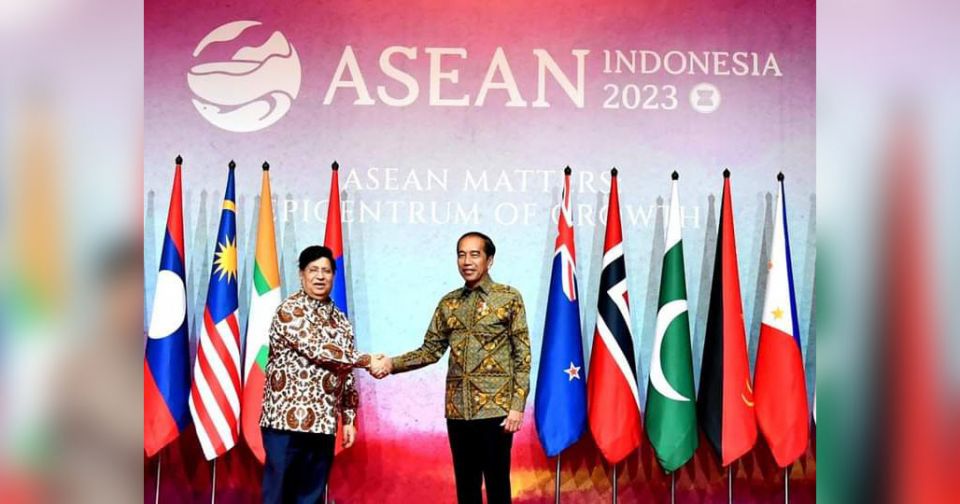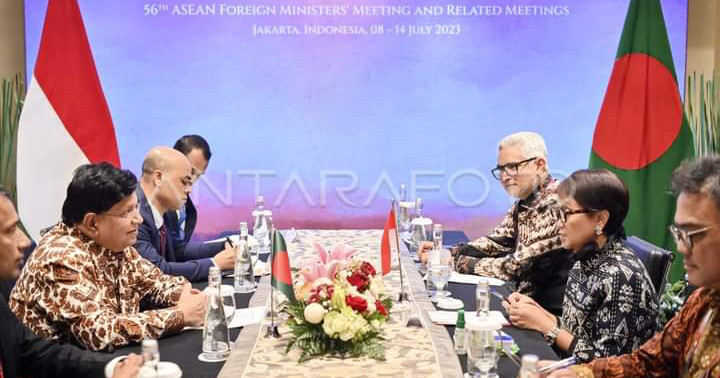Foreign Minister Dr AK Abdul Momen sought stronger support from Asean leaders to ensure safe and voluntary repatriation of Rohingyas

Bangladesh has once again pushed the Asean to take the country as a "sectoral dialogue partner".
Foreign Minister Dr AK Abdul Momen urged the Asean member states "to provide active support to Bangladesh's candidacy for attaining Sectoral Dialogue Partner status by the next Asean Summit", the foreign ministry said on Saturday.
Dr Momen was speaking at the 30th Asean Regional Forum (ARF) in Jakarta.
He sought stronger and more effective support of Asean leaders and ARF member states to ensure safe, sustainable, dignified and voluntary return of Rohingyas to their homeland.
The Association of Southeast Asian Nations, or Asean, was established on August 8, 1967 in Bangkok.
Indonesia, Malaysia, Philippines, Singapore, Thailand, Brunei Darussalam, Viet Nam, Lao PDR, Myanmar, and Cambodia are the ten Member States of Asean.
For external engagement, to date, Asean has established Dialogue Partnerships with Australia, Canada, China, European Union, India, Japan, New Zealand, Republic of Korea, Russian Federation, United Kingdom and the United States.
The Sectoral Dialogue Partnerships include Brazil, Norway, Pakistan, Switzerland, Türkiye, and United Arab Emirates.

Development partners include Chile, France, Germany and Italy.
Bangladesh has been seeking to be a partner of the sectoral dialogue format.
Appreciating this year's theme, “Asean Matters: Epicentrum of Growth”, the foreign minister acknowledged strong and effective commitment of Asean for strengthening regionalism and multilateralism as well as Asean centrality in furthering confidence building through constructive dialogue.
While presenting an overview of Bangladesh's socio-economic development over the last decade, he highlighted effective Covid management, Disaster Risk Reduction, investment in sustainable infrastructure, contribution in UN peace keeping operation.
He also cited Indo-Pacific Outlook (IPO) of Bangladesh emphasizing the peace-centric foreign policy of Bangladesh, based on Father of the Nation Bangabandhu Sheikh Mujibur Rahman's dictum “friendship to all, malice towards none”.
In addition, he stressed the necessity of financing and technology transfer for effectively graduating from LDC, attaining SDGs, becoming a knowledge-based advanced economy and building a prosperous and climate-resilient delta in time.
He reiterated Bangladesh's commitment and continued support to ARF activities aimed at collective security, peace and shared prosperity.
The meeting concluded by adopting seven outcome documents including:
1. ARF Statement on the Commemoration of 30 Years of the ARF
2. Statement of the 30th ASEAN Regional Forum on Strengthening Maritime Non- Traditional Security Cooperation
3. ARF Statement on Nuclear Risk Reduction
4. Guidance on Nuclear Risk Reduction: In Pursuit of a World Without Nuclear Weapons
5. Collection of Documents Commemorating the 30th Anniversary of the ASEAN Regional Forum
6. ARF Work Plan for Counter-Terrorism and Transnational Crime 2023-2025
7. Concept Paper on the Establishment of an Expert Group on Ferry Safety












